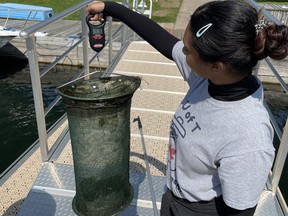
It takes a village – in this case, Ports Toronto and the University of Toronto’s Trash Team.
Toronto’s Harbour is now free of nearly 100,000 pieces of plastic, thanks to Ports Toronto’s Trash Trapping Program Network and the student researchers whose mission it is to increase waste literacy in the community while reducing plastic pollution in our ecosystems.
From our newsroom to your inbox at noon, the latest headlines, stories, opinion and photos from the Toronto Sun.
Thanks for signing up!
A welcome email is on its way. If you don't see it, please check your junk folder.
The next issue of Your Midday Sun will soon be in your inbox.
Ports’ Seabins program did much of the work, though, as the 10 bins diverted 92,891 small pieces of plastic pollution from the bay from May to September last year.
The microplastics found (so, items smaller than five millimetres) were the most common amid the debris, but there was also 18 kilograms of “anthropogenic” (think human-related debris) items that were recovered.
Those items included hundreds to thousands of pieces of hard plastic fragments broken off from larger plastic items, food wrappers, cigarette butts, bottle caps, cigar tips and plastic straws.
Among the large items found were more than 100 “fatbergs,” which are described as “rock-like masses formed by the combination of fat, grease and wastewater materials,” like diapers and wet wipes.
RECOMMENDED VIDEO
Ports Toronto hopes residents will reconsider what they wash down the drain after witnessing the “troubling rise in plastic solution” that “threatens the sustainability and biodiversity of our lakes and waterways,” according to RJ Steenstra, President and CEO, PortsToronto.
Dr. Chelsea Rochman, Head of Operations at the U of T Trash Team, is hopeful and calls 2022 “a big year” for the study which deployed research assistants who worked daily through the summer to empty, quantify and characterize what was recovered in the Seabins.
“Their positive impact helps remove litter and synthesize data that can be used to inform upstream policies to reduce plastic pollution.”
-

Feds say scientific proof plastic pollution 'pervasive in the environment'
-

Canada's single-use plastic ban lacks proof: Report
-

Restaurants debut new takeout ware amid phase-in of single-use plastics ban


